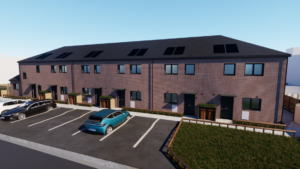Why we need a re-think to tackle the housing crisis sustainably

Sue Riddlestone, OBE, chief executive and co-founder of Bioregional discusses why we need a housing strategy re-think to ensure that government’s building target 300,000 homes will lead to healthier, happier lives.
The UK government has pledged to build 300,000 homes a year until the mid-2020s in a bid to tackle the housing crisis. On the face of it, this is encouraging talk – however the current build, build, build mantra is concerning because it leaves little space for planning strategically and building homes in a sustainable way.
In the UK, about half of our carbon emissions are related to how and where we build our homes. Approximately 27% of these are from heating our homes, and the rest from travel emissions.
That’s why – in light of the Paris Agreement where all nations agreed that the whole world needs to be zero carbon by 2050, and the global commitment to the Sustainable Development Goals – it’s so important to get housing right. Not in five or ten years, but right now. If we don’t, we are just locking in unsustainable lifestyles for decades to come.
As housebuilders, we have an ability – even a responsibility I’d argue – to build places that help people live healthier, happier lives. That means thinking about how people in a new community will be able to travel to work, making sure there are local daily amenities and green space, where children will be able to play outside, and whether their homes will keep them warm at a low cost.
If we plan things holistically in this way, we can create zero-carbon communities where people will want to live. This may sound like a utopian dream, but it doesn’t have to be – it’s already happening.
Twenty years ago, Bioregional initiated and helped build BedZED – the UK’s first mixed-used eco-village, which aimed to be zero-carbon. I have lived here since 2002 and can attest to the fact it’s a great place to live. Not only do we have warm, comfortable, energy-efficient homes with lower-than-average bills, we also enjoy a sense of neighbourliness not often found in a London suburb.
After BedZED, we took our learning and transformed it into the One Planet Living framework. These ten simple principles work together to help embed sustainability at the heart of any project. The One Planet Principles are now being used across the world– from a small community of 131 homes in Seattle to two apartment blocks in the heart of Brighton. These communities are reducing residents’ carbon footprints, creating a sense of community and producing better health outcomes.
So, let’s collectively get a grip on this. At the moment, there are few signals from government that zero-carbon homes are even desired – especially since the scrapping of the zero carbon homes standard in 2015. Yet earlier this year, the Home Builders Federation told Radio 4’s Costing The Earth programme that they are ready to build sustainable, zero-carbon homes if the Government requires it and provided that the requirements are workable.
The Government could take this olive branch and liaise with housebuilders and organisations – such as Bioregional, the UK Green Building Council, CPRE and the Wildlife Trusts – and reintroduce a zero-carbon homes policy in a way which works for the homebuilding industry and which works hand-in-hand with a zero-carbon energy strategy for the country. These organisations could also help support training, education and knowledge-sharing for building zero carbon homes, including meeting energy-efficiency standards.
We also need to build homes in the right places, near existing settlements with public transport hubs, amenities and centres of employment. When I was a member of the Eco Towns Challenge Panel there was talk of using available land in remote countryside locations – but what’s the point in building a lot of homes where people are unable to use public transport and are going to have to drive long distances to work or to buy their goods? There is also a very real danger that we could end up creating out-of-town ghettoes.
It’s crucial we identify where the best locations are and there’s a lot to be said for local knowledge in understanding the best places to build. However, I also think that it’s fairly obvious and some criteria needs to be developed so we can offer fast-track support and proper masterplanning of villages, towns and cities where new homes are to be built to enable zero-carbon lifestyles alongside the necessary infrastructure.
Then there is the issue of land value, now so overinflated it prevents good-quality development. One way to tackle this is to reduce the infrastructure for cars. If land is valuable, why waste it on car parking and access roads? Cars don’t have to be parked directly outside a house – in fact, studies have shown that if people walk past their bike or a bus stop on the way to their car, they will be less likely to use their car. By placing car parking spaces towards the outside of a development, streets are safer for children to play and for people to socialise. We can then maximise the value of the site by using some of the space freed up from cars to build more sustainable homes.
Another way we can address land value is to give more powers, and sources of finance to local authorities and community-led development, to purchase land and build the homes that are so desperately needed. We have just set up our own housebuilding arm, Bioregional Homes and have secured our first site in Chobham. A central part of the plan is to work in partnership with local people to design the scheme and create a Community Land Trust to own the land in perpetuity. This means that reduced house prices for people living locally will be protected permanently. Our vision for the site is an affordable, neighbourly, zero-carbon community surrounded by green space where it’s easy and convenient to make sustainable choices.
Ultimately we desperately need the government to show that this way of housebuilding is desired. It is a massive opportunity for us to address two of the most urgent issues of our time – the housing crisis and the climate crisis.















